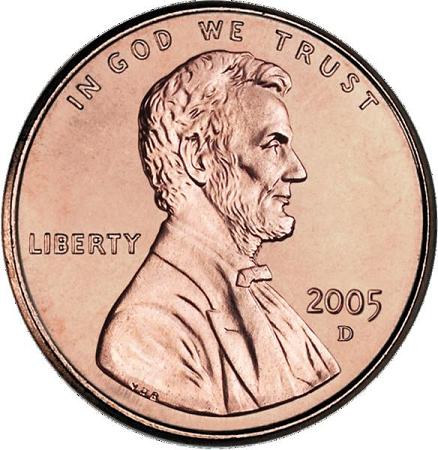In For A Penny
The first Lincoln penny was struck on August 7 in 1909. Lately, people have been suggesting we get rid of the penny, since it actually costs more to make it than it's worth. People leaves pennies (and nickels, dimes, even quarters) near the cash register because they're worth so little. And they won't bend down to pick one up.
The anti-penny movement has a point. In a world where a dime won't buy you anything, what's a penny? We used to have mills worth one-tenth of a penny and they're long gone. It may be nice if inflation didn't do this, but it has, so that's that. (I suppose some people think inflation is a good thing. If nothing else, it's made more millionaires than oil, automobiles and computers combined.)
At the other end, though, there is the creeping worry that we're getting rid of money altogether. The biggest denomination available in the U.S. is the $100. Used to be considerably higher. Some are suggesting it go down to the $20. This is, I've heard, both to stop counterfeiting and make illegal activity like drug trafficking harder. It also makes losing money, or being robbed, harder (in some ways--easier in other ways).
But if we get rid of money, and make everything in our economy based on electronic transfers, that means that nothing we do can escape the notice of governmental bodies. Good, they might say--you can't cheat. But what about little things? Playing poker. Leaving a tip. Babysitting. A yard sale. Lending or receiving a few bucks from a friend. Spending an evening in a motel where you want to be alone.
American citizens are required to report their income, that I understand. But we're not required to report our lives.


2 Comments:
The Metro in Washington DC originally used disposable paper tickets that were purchased with cash. Around five years ago, they converted to plastic cards that you keep; you can refill them with additional money when they run low. Of course you can dispose of them if you like, but since there's a fee for the card the first time you buy it, everyone just keeps one card and reuses it.
Most people refill the card's value with their credit card. Others prefer cash, but I'm sure that most of them have occasionally been low on cash and used their credit cards.
Therefore, the Metro computers could be keeping track of all the movements made by these people, identifying their names based on their credit cards. Fortunately, we know that our government would never choose to do such a thing....
Prepaid anonymous cash cards solves this problem
Post a Comment
<< Home